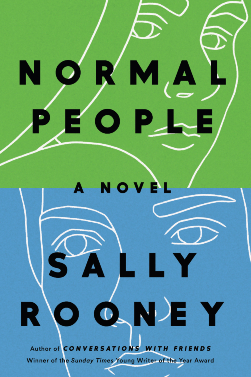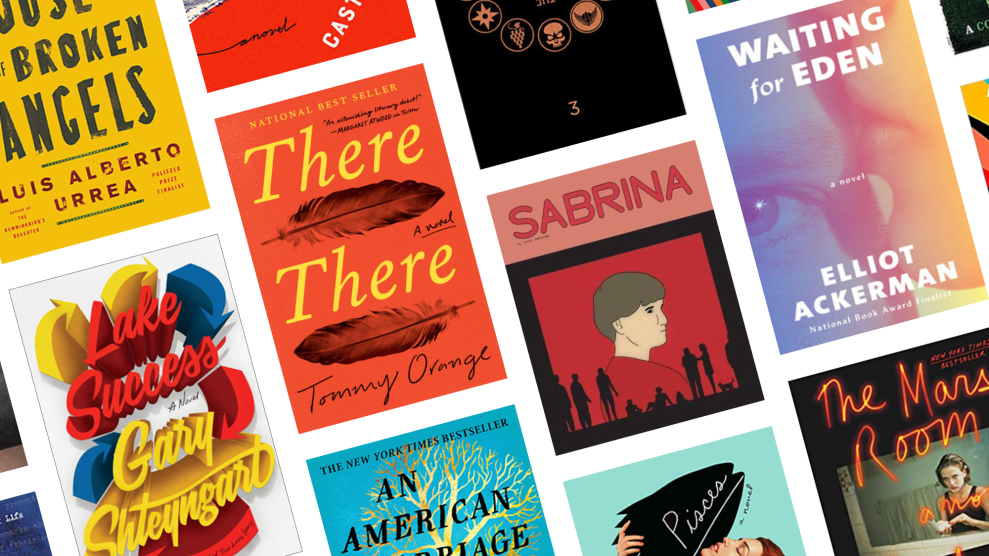
Jonny L Davies
The plot of Sally Rooney’s second novel, Normal People, is deceptively simple, but behind a classic coming-of-age plot lies a complex commentary on class and gender. Two Irish teenagers, Connell and Marianne, meet at school and become close because Connell’s mother cleans the mansion where Marianne’s wealthy family lives. The novel follows their relationship as they grow up and attend the prestigious Trinity College Dublin, which also happens to be Rooney’s alma mater. When they arrive at Trinity, the formerly friendless Marianne finds herself at ease among the privileged crowd, while Connell finds that his childhood popularity has been displaced by a sense of alienation.

Rooney likes to talk about the book in abstract, theoretical terms, referencing Marxist and feminist theory. These concerns are always just below the surface in the novel, as Connell and Marianne negotiate the subtle shifts in power in their relationship, which evolves from romance to friendship and back again. Through these two characters, the novel poses questions about individualism, masculinity, mental health, and how money conditions relationships. In this way, Normal People is reminiscent of Elena Ferrante’s Neapolitan novels. The novel was already a bestseller in Rooney’s native Ireland, and part of Rooney’s appeal is that her books work on multiple levels—you might come for the snappy dialogue but stay for the big ideas.
Rooney, 28, launched her writing career in 2015 after she published an essay in The Dublin Review about her college debate days. Rooney quit the activity soon after becoming the top-ranked debater in Europe: “I no longer found it fun to think of ways in which capitalism benefits the poor, or things oppressed people should do about their oppression,” she wrote. “Actually I found it depressing and vaguely immoral.” (Normal People features a brief cameo from a debater, a college boyfriend of Marianne’s who joins in an effort to get a neo-Nazi to speak on campus.) According to a recent New Yorker profile, the Dublin Review essay attracted an agent’s attention, and her debut novel, Conversations with Friends, sold soon after. Together, the two novels have earned her a heap of critical praise—Normal People has already picked up a couple prestigious awards and was longlisted for the Man Booker Prize last year. The novel comes out in the US on April 16.
Sally Rooney made some time to talk to Mother Jones about the political relevance of fiction, why it’s important to write about class, and adapting her novel for TV.
Mother Jones: In Normal People, you write so perceptively about the social dynamics between teenagers. It made me wonder what you were like as a teenager.
Sally Rooney: I guess I was quite introverted. I read a lot. I went through phases of incredibly strong interests in things and wanted to learn everything about a particular topic for a few weeks or months, and then I’d move on to the next thing. I was a very intense, focused person. I was not a lot of fun. I didn’t have a very active social life or anything. I mean, I don’t think I was way more awkward than the average teenager. Teenagers are kind of awkward a lot of the time anyway. So I was definitely within the normal awkwardness range.
MJ: You started writing Conversations with Friends when you were 23, and it sold in a seven-way auction. Did you feel any pressure being so successful at such a young age?
SR: By nature, I’m not really someone who feels very connected with the outside world in that way. I feel like I’m not all that invested in what happens to the book once I’ve finished writing it. Like it’s great, and I’m in an incredibly lucky position and because of that, I have the financial independence to pursue more writing, which is what I really want to do. So I don’t take that for granted.
But as to whether I take that pressure onto my work, I hope not. But you can’t take the success seriously unless you’re also going to take failure seriously. So if you take good reviews seriously then you’re kind of making a pact with yourself to also take it seriously when someone says, “This book is terrible and she’s a talentless hack.”
MJ: Normal People depicts a relationship with so many power imbalances, but maybe the most salient one is class. Why did you decide to focus on that?
SR: [Since attending Trinity] I’ve definitely been very interested in Marxist social theory, Marxist cultural theory, and economics. And that comes from my background a bit as well, because my parents were socialists and raised us with a kind of socialist worldview. But it wasn’t until I got to university that I started actually reading the theory and thinking about it independently, and wondering how to apply these theories to the world that I saw around me.
So I guess I’m coming to the work of writing a novel with these existing theoretical frameworks—sort of a Marxist framework, a feminist framework. And then starting from that, trying to use that perspective in a way that can be helpful in constructing a novel. It’s not like it’s my guidebook on how to be a Marxist. It is a novel. It’s not really didactic in any way. But certainly, the framework of class, because it’s so central to how I conceptualize the society that we live in, had to be very central to how I went about observing the world of the book.
MJ: In both of your novels, you create characters who can be alarmingly passive. But then near the end of Normal People, Marianne seems to justify that tendency, saying, “No one can be independent of other people completely, so why not give up the attempt.” What interests you about writing characters like that, and how much do you share that sentiment?
SR: I think a direction that we’re heading in philosophically in terms of the culture is further and further in the direction of individualism. And I’m very skeptical of the individual as a framework for political organizing. I guess one way that I’m trying to complicate that philosophically is to point out that the independence of the individual is a total myth. That we’re all completely interconnected, and no matter how self-sufficient you think you are, you’re always actually relying on other people. One of the reasons that it’s so compelling to me is because I really like to feel that I am independent and self-sufficient. So it’s probably me trying to push back against that. But I don’t think I personally share the tendencies to be passive and indecisive.
MJ: Your character Connell, who’s also a writer, expresses some ambivalence about the role and political relevance of fiction. Connell worries that “it feels intellectually unserious to concern himself with fictional people marrying one another.” I know you’ve expressed similar concerns in the past—have you come to any conclusions?
SR: Sometimes I read nice things on the internet about why it’s still important to read novels. And I come away thinking, “Yeah, it’s great! Novels are really important!” And then I think, “The world is going to be underwater in like 20 years. What am I doing? How am I sitting around at this moment of obvious historical crisis, civilization basically on the brink of collapse?” I can’t really square the circle on that one. I don’t really believe that what I’m doing is fundamentally all that worthwhile. I would like to believe that the arts have like, the value of consolation, which is that if we’re all in the struggle together then we’ll need art as a form of consolation to make our lives feel meaningful while the struggle goes on. But we haven’t actually really gotten to the bit, culturally speaking, where we’re in the struggle yet. We’re very much still at the stage where things are going horribly wrong, and there hasn’t been any sort of mass uprising.
MJ: But Connell also thinks, “the same imagination he uses as a reader is necessary to understand real people also, and to be intimate with them.” That’s one argument for the value of fiction, even if it’s limited. Do books to that for you?
SR: Yeah. And books that continue to do it all the time. I think definitely writing has an enormous power in my life to raise consciousness in a politically productive way. And also, of course, to make me understand other people better. What I do in my work is quite observational; I spend a lot of my time watching people and trying to observe them. Maybe it’s not that I’m particularly good at it, it’s that I’m actually worse than average at it, and that’s why I need to write novels. Maybe for other people, it’s an intuitive process, and for me, it takes backbreaking labor of writing novel upon novel to actually try and understand what other people are about.
MJ: Are there any interview questions that you’re tired of getting at this point?
SR: There’s a very understandable reason why interviewers want to get a background on my family and stuff. I get asked about it pretty much every time, and yet every time I’m like, “Oh, gee, my childhood. God, I don’t know what I have to say about that.” Not unlike some of the characters of my books, I feel like I’m in much more comfortable territory talking theoretically than I am talking about myself.
MJ: A lot of people have asked if you’re a “millennial novelist” or the “voice of your generation.”
SR: Yeah, the “voice of your generation” thing is just painful. And you don’t want to seem ungracious, but obviously, I just have no interest in being described that way. I do not want that at all. Thank you, but absolutely no thank you.
MJ: You’re working on a BBC adaptation of Normal People. What has that been like?
SR: Parts of it I have found easier than I thought it would be, and then parts of it are much more complex than I imagined. On the page, you can just say stuff like, “They had a discussion about Ronald Reagan.” But you can’t say that on the TV, unless you’re actually going to write that discussion. And you probably don’t want to make the viewers sit through a five-minute discussion about the Reagan administration.
MJ: You write characters who inhabit a very similar world to you. Are you going to stick with that, or try something new?
SR: I think I will keep doing that. What I do see myself doing is myself inhabiting different worlds, and then, therefore, being able to broaden what I can write about. When I started writing Conversations with Friends I hadn’t even finished my master’s degree. My options for the kind of world that I could write about were limited to basically one, maybe one and a half. I don’t think that I’m ever going to be writing from the perspective of communities whose life experiences are vastly different from my own. And partly that’s because people within those communities are already great writers and can tell their own stories much, much better than I could ever hope to do.
This interview has been edited and condensed for clarity.















